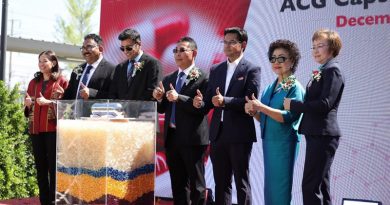“Innovation System Development” MOU signing to progress electric vehicles (EV) technology education
“Innovation System Development” MOU signing to progress electric vehicles (EV) technology education between MUT and Association of Private Colleges of Technology and Vocational Education of Thailand
Bangkok : As Thailand has emerged as one of the world’s largest manufacturing bases for electric vehicles (EV) and electric vehicle parts, Electric Vehicle Association of Thailand (Board EV) released 30/30 EV manufacturing policy that aims to increase production of ZEV (Zero Emission Vehicle) to 30% from the overall automobile market by 2030. This initiative is ushering Thailand into a Low-carbon Society and ranking the country among the environmental conscious ones such as China, Japan, USA and many European countries with evident measure to increase EV use.
Mahanakorn University of Technology (MUT) recently joins hands with Association of Private Colleges of Technology and Vocational Education of Thailand (PVET) under the patronage of Her Royal Highness Princess Maha Chakri Sirindhorn to sign an “Innovation System Development” MOU. The aim is to research and develop education of EV technology in private technology colleges and vocational schools all over Thailand, equipping the country’s future mechanical engineers with proper knowledge and tools to evolve with the advanced, fast-changing world. The MOU signing was presided by Asst. Prof. Dr. Panavy Pookaiyaudom, chancellor of Mahanakorn University of Technology, and Dr. Prasert Klinchu, president of Association of Private Colleges of Technology and Vocational Education of Thailand and director of Easter College of Technology (E-TECH), along with executives, faculty members and committees from both organizations in attendance, at Meeting Room on Level 4 of Mahanakorn Institute of Innovation : MIIX building at Mahanakorn University of Technology.
Asst. Prof. Dr. Panavy Pookaiyaudom, chancellor of Mahanakorn University of Technology, enthuses that the “Innovation System Development” MOU benefits both parties by strengthening research and development of EV technology education. The initiative, which also aims to enhance skills in design and development of both small and medium-sized EV for educational purposes, targets students in academic institutes under the care of Association of Private Colleges of Technology and Vocational Education of Thailand. The specifically designed training program will fully equip the students with international-level knowledge and skills in EV technology, as well as confidence to enter the workforce.
Mahanakorn University of Technology’s signature academic approach, which is Problem-based Learning or PBL, encourages students to learn from problematic scenarios that they will likely experience in real work environment. This refreshing learning method promptly prepares the student for real-life challenges early on. The PBL process brings forth self-learning and problem-solving skills as students are required to determine the gravity of the problems, set the scope, brainstorm for solutions and design models to replicate real situations. As for the Innovation System Development agreement, the research team has developed extensive tools and various teaching methods that best suit the students’ lifestyle for the faculty members to implement.
Dr. Prasert Klinchu, president of Association of Private Colleges of Technology and Vocational Education of Thailand, states that the long-standing relationship with MUT and the confidence in MUT as the number one private college in technology and innovation form the foundation of this solid collaboration and determination for both parties to achieve common goal. The program sets out to improve both theoretical and practical learnings in more than 400 institutes all over Thailand, and at the same time broadens skills of the teaching staff.
The association also believes that MUT’s exceptional potential in site readiness, equipment availability and expertise of faculty members will give the students in auto mechanical disciplines unique opportunities to improve their knowledge of EV technology which will allow them to confidently implement and adapt their skills in real work environment.
Boosted by the government’s policy to support EV, Thailand’s EV industry has seen unprecedented growth in less than 1 year. Increasing foreign investment for EV production, auto parts and batteries also helps reinforce Thailand’s automobile export and overall economy. Therefore, mechanical engineering is becoming a highly desirable profession in the future labor market that secondary school graduates and diploma students should take into consideration when pursuing vocational or higher education.
EV innovation and new technologies are key factors that inspire countries around the world to shift to clean energy. Besides the mission to strengthen studies of innovation and technology, both MUT and the association are also committed to instill social and environmental awareness in the students and encourage them to preserve energy and the environment both directly and indirectly. As more and more clean energy is being used via EV, air pollution subsides and balance of life is restored, propelling us to further improve our habitat and find sustainable, tangible, and efficient solutions for environmental issues in the future.




